|
Play is where children get to create decisions. This is a big one that many of us adults struggle to get our heads (and practice) around. So let's get our heads around it now. We have been running on the saying "play is self-chosen" for a long time, and while some of us interpet this to mean that the child will choose when, what and how to engage in play and that we step back. Some of us interpret it to mean that we offer a choice and the child will choose when, what and how to play from our offerings. The importance of making choices is hugely important in a child's life - especially when, in their daily relationships they might not have many if any choices at all. Equally important though is the ability to create the choices that they will choose from. And it is in play they should get to create their own choices. For many children this vital charactoristic of play is missing. To ensure it is provided, we the adults are required to step back and observe the child at play, creating and making their own choices in play. Play is a place of opportunity. Children need more risky play, children need imaginative play, children need to move and hang upside down, children need to climb trees, children need to get 'messy' and play in the mud! Unfortunately, what can happen with a list like this, is that adults start setting up activities for the children to do these things naturally found in play. Play. Activities. Two different things. Children will naturally find risk, grow imaginations, move, climb and much more at the right pace and through their own volition. When we provide the time, space and place for play to unfold. Children need adults to provide them with the opportunity. We don't need to set up activities; instead, we set up the environment for opportunity. Play is not something we do to a child - play is in the child. Play time is where children grow physically and cognitively and grow autonomy and capability. It is important that, as adults, we value, respect and provide children with the 'hands off' time for them to play and grow. When children are sat up to play, given a hand to balance, provided instructions, and lifted to the places they cannot reach yet, we rob them of cashing in on all the benefits play offers. When we find ourselves doing things to the child at play and in their play time, it's time to step back and observe. Play is always meaningful to the child. When a child comes up with their own idea of what to do and spend time doing, it will always be meaningful to them. The trouble is, when adults keep having ideas of what to do and how to spend time. Even if they are using the word "play" to describe their activities and play-based learning ideas, not only can it be meaningless to the child, it can also steel their ability to have their own ideas and initiate their own play. Play is the root of intrinsic motivation. It is through play that important development happens in the young human being - cognitive development, motor development, vestibular, world and social intelligence development, even the nervous system develops through play. When we see the child rolling, crawling, mouthing and exploring, these are the signs that all this important development is happening on the inside. There is an intrinsic motivation in human children to play out these behaviours, and the development happens with them. The motivation for this play/development is intrinsic, and all we have to do - as Play Allies - is provide the right conditions for their intrinsic development to unfold. To provide these conditions, we offer the child TIME to do their own thing, a safe SPACE where we are near so they don't feel isolated, and a play-rich PLACE with open-ended materials and space available. To support intrinsic motivation, it is essential to avoid 'extrinsic motivators' in the environment such as 1/ directions, 2/ words of encouragement, and 3/ set-up 'invitations' or activities. It is super helpful for every Play Ally to know about intrinsic motivation and extrinsic motivators. Children of all ages follow their genetically encoded play-urges naturally. We can see these Universal Play Patterns being played out today, just as they have throughout time, in every culture, on all continents. Play is the opportunity for children to become capable, do things themselves, grow their autonomy and learn how to learn. Because play intelligence is ‘built in’, it means that the child can lead their own play – without being taught or having toys, activities or ‘helping hands’. When play unfolds for the player they know exactly what to do, in the right sequence, and at the right pace. And they find around them all the objects they need for their play. In play the child is capable. Nature Play - take a step back and observe your child at play Written by Clare Caro |
|
Copyright © 2024 Nature Play
|

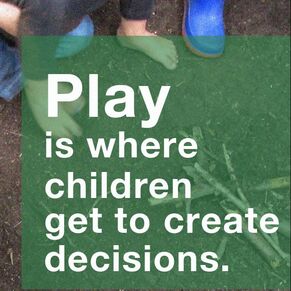
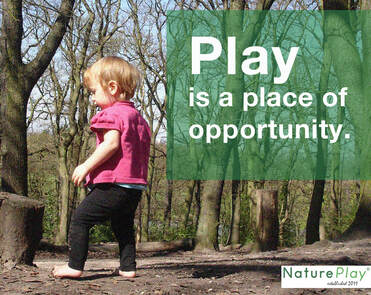
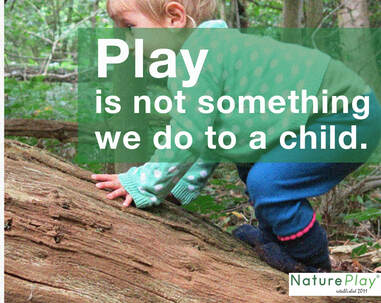
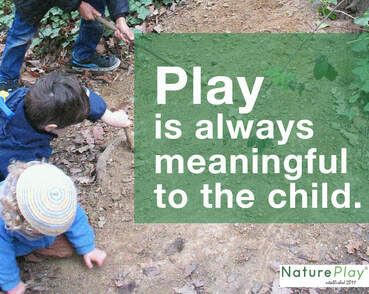
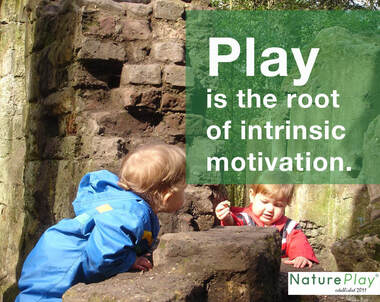
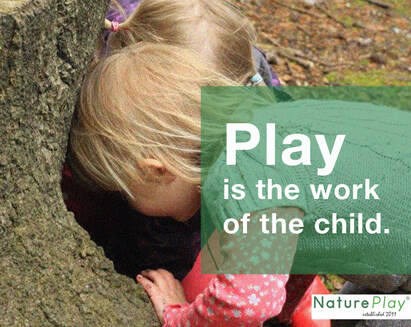
 RSS Feed
RSS Feed